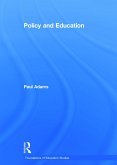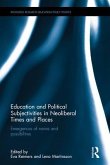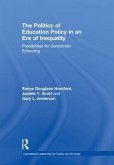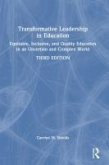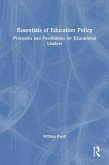David Phillips (ed.)Selections from the Oxford Review of Education
Tracing Education Policy
Selections from the Oxford Review of Education
Herausgeber: Phillips, David; Walford, Geoffrey
David Phillips (ed.)Selections from the Oxford Review of Education
Tracing Education Policy
Selections from the Oxford Review of Education
Herausgeber: Phillips, David; Walford, Geoffrey
- Gebundenes Buch
- Merkliste
- Auf die Merkliste
- Bewerten Bewerten
- Teilen
- Produkt teilen
- Produkterinnerung
- Produkterinnerung
A selection of seminal articles from thirty years of the Oxford Review of Education, focusing on the development of educational policy.
Andere Kunden interessierten sich auch für
![The Politics of Education Policy in an Era of Inequality The Politics of Education Policy in an Era of Inequality]() Sonya DouglassThe Politics of Education Policy in an Era of Inequality189,99 €
Sonya DouglassThe Politics of Education Policy in an Era of Inequality189,99 €![Policy and Education Policy and Education]() Paul AdamsPolicy and Education180,99 €
Paul AdamsPolicy and Education180,99 €![Education and Political Subjectivities in Neoliberal Times and Places Education and Political Subjectivities in Neoliberal Times and Places]() Education and Political Subjectivities in Neoliberal Times and Places215,99 €
Education and Political Subjectivities in Neoliberal Times and Places215,99 €![The Politics of Education Policy in an Era of Inequality The Politics of Education Policy in an Era of Inequality]() Sonya DouglassThe Politics of Education Policy in an Era of Inequality180,99 €
Sonya DouglassThe Politics of Education Policy in an Era of Inequality180,99 €![Transformative Leadership in Education Transformative Leadership in Education]() Carolyn M ShieldsTransformative Leadership in Education180,99 €
Carolyn M ShieldsTransformative Leadership in Education180,99 €![Globalizing Education Policy Globalizing Education Policy]() Fazal RizviGlobalizing Education Policy181,99 €
Fazal RizviGlobalizing Education Policy181,99 €![Essentials of Education Policy Essentials of Education Policy]() William EwellEssentials of Education Policy181,99 €
William EwellEssentials of Education Policy181,99 €-
-
-
A selection of seminal articles from thirty years of the Oxford Review of Education, focusing on the development of educational policy.
Hinweis: Dieser Artikel kann nur an eine deutsche Lieferadresse ausgeliefert werden.
Hinweis: Dieser Artikel kann nur an eine deutsche Lieferadresse ausgeliefert werden.
Produktdetails
- Produktdetails
- Verlag: Taylor & Francis
- Seitenzahl: 480
- Erscheinungstermin: 8. Juni 2006
- Englisch
- Abmessung: 238mm x 161mm x 31mm
- Gewicht: 621g
- ISBN-13: 9780415398619
- ISBN-10: 0415398614
- Artikelnr.: 22524553
- Herstellerkennzeichnung
- Libri GmbH
- Europaallee 1
- 36244 Bad Hersfeld
- gpsr@libri.de
- Verlag: Taylor & Francis
- Seitenzahl: 480
- Erscheinungstermin: 8. Juni 2006
- Englisch
- Abmessung: 238mm x 161mm x 31mm
- Gewicht: 621g
- ISBN-13: 9780415398619
- ISBN-10: 0415398614
- Artikelnr.: 22524553
- Herstellerkennzeichnung
- Libri GmbH
- Europaallee 1
- 36244 Bad Hersfeld
- gpsr@libri.de
David Phillips is Professor of Comparative Education and Fellow by Special Election at Oxford University, UK. Geoffrey Walford is Professor of Education Policy and a Fellow of Green College at the University of Oxford, UK.
Introduction Section I 1. The concept of equality in education Mary Warnock
2. Sociology and the equality debate A.H. Halsey 3. Equality and education:
fact and fiction Hans Eysenck 4. The impossibility of a core curriculum
Alan Harris 5. The impossibility of a core curriculum: a reply to Harris
John White 6. Authority, bureaucracy and the education debate A.H. Halsey
7. Power and participation Vernon Bogdanor 8. The seventy thousand hours
that Rutter left out Anthony Heath and Peter Clifford Section II 9. The
educational consequences of Mr Norman Tebbit Stuart Maclure 10. Reconciling
the irreconciliable: declining secondary schools rolls and the organisation
of the system W.F. Dennison 11. Educational attainment in secondary schools
John Marks and Caroline Cox 12. Problems in comparing examination
attainment in selective and comprehensive secondary schools Ken Fogelman
13. Selection does make a difference Peter Clifford and Anthony Heath 14.
The expansion of special education Sally Tomlinson Section III 15.
Evolution or revolution: dilemmas in the post ERA management of special
educational needs by local authorities Catherine Clark, Alan Dyson and Alan
Millward 16. Equality fifteen years on Mary Warnock 17. British schools for
British citizens? Barry Troyna and Geoff Whitty 18. Specialisation and
selection in secondary education Tony Edwards and Geoff Whitty 19. Choice
and diversity in education James Tooley 20. Through the revolution and out
the other side Stuart Maclure 21. 14-19 education: legacy, opportunity and
challenges Michael Young and Ken Spours Section IV 22. From City Technology
Colleges to sponsored grant-maintained schools Geoffrey Walford 23.
Faith-based schools and state funding: a partial argument Harry Judge 24.
School admissions and 'selection' in comprehensive schools: policy and
practice Anne West, Audrey Hind and Hazel Pennell 25. Labour government
policy 14-19 Richard Pring 26. Reinventing 'inclusion': New Labour and the
cultural politics of special education Derrick Armstrong
2. Sociology and the equality debate A.H. Halsey 3. Equality and education:
fact and fiction Hans Eysenck 4. The impossibility of a core curriculum
Alan Harris 5. The impossibility of a core curriculum: a reply to Harris
John White 6. Authority, bureaucracy and the education debate A.H. Halsey
7. Power and participation Vernon Bogdanor 8. The seventy thousand hours
that Rutter left out Anthony Heath and Peter Clifford Section II 9. The
educational consequences of Mr Norman Tebbit Stuart Maclure 10. Reconciling
the irreconciliable: declining secondary schools rolls and the organisation
of the system W.F. Dennison 11. Educational attainment in secondary schools
John Marks and Caroline Cox 12. Problems in comparing examination
attainment in selective and comprehensive secondary schools Ken Fogelman
13. Selection does make a difference Peter Clifford and Anthony Heath 14.
The expansion of special education Sally Tomlinson Section III 15.
Evolution or revolution: dilemmas in the post ERA management of special
educational needs by local authorities Catherine Clark, Alan Dyson and Alan
Millward 16. Equality fifteen years on Mary Warnock 17. British schools for
British citizens? Barry Troyna and Geoff Whitty 18. Specialisation and
selection in secondary education Tony Edwards and Geoff Whitty 19. Choice
and diversity in education James Tooley 20. Through the revolution and out
the other side Stuart Maclure 21. 14-19 education: legacy, opportunity and
challenges Michael Young and Ken Spours Section IV 22. From City Technology
Colleges to sponsored grant-maintained schools Geoffrey Walford 23.
Faith-based schools and state funding: a partial argument Harry Judge 24.
School admissions and 'selection' in comprehensive schools: policy and
practice Anne West, Audrey Hind and Hazel Pennell 25. Labour government
policy 14-19 Richard Pring 26. Reinventing 'inclusion': New Labour and the
cultural politics of special education Derrick Armstrong
Introduction Section I 1. The concept of equality in education Mary Warnock
2. Sociology and the equality debate A.H. Halsey 3. Equality and education:
fact and fiction Hans Eysenck 4. The impossibility of a core curriculum
Alan Harris 5. The impossibility of a core curriculum: a reply to Harris
John White 6. Authority, bureaucracy and the education debate A.H. Halsey
7. Power and participation Vernon Bogdanor 8. The seventy thousand hours
that Rutter left out Anthony Heath and Peter Clifford Section II 9. The
educational consequences of Mr Norman Tebbit Stuart Maclure 10. Reconciling
the irreconciliable: declining secondary schools rolls and the organisation
of the system W.F. Dennison 11. Educational attainment in secondary schools
John Marks and Caroline Cox 12. Problems in comparing examination
attainment in selective and comprehensive secondary schools Ken Fogelman
13. Selection does make a difference Peter Clifford and Anthony Heath 14.
The expansion of special education Sally Tomlinson Section III 15.
Evolution or revolution: dilemmas in the post ERA management of special
educational needs by local authorities Catherine Clark, Alan Dyson and Alan
Millward 16. Equality fifteen years on Mary Warnock 17. British schools for
British citizens? Barry Troyna and Geoff Whitty 18. Specialisation and
selection in secondary education Tony Edwards and Geoff Whitty 19. Choice
and diversity in education James Tooley 20. Through the revolution and out
the other side Stuart Maclure 21. 14-19 education: legacy, opportunity and
challenges Michael Young and Ken Spours Section IV 22. From City Technology
Colleges to sponsored grant-maintained schools Geoffrey Walford 23.
Faith-based schools and state funding: a partial argument Harry Judge 24.
School admissions and 'selection' in comprehensive schools: policy and
practice Anne West, Audrey Hind and Hazel Pennell 25. Labour government
policy 14-19 Richard Pring 26. Reinventing 'inclusion': New Labour and the
cultural politics of special education Derrick Armstrong
2. Sociology and the equality debate A.H. Halsey 3. Equality and education:
fact and fiction Hans Eysenck 4. The impossibility of a core curriculum
Alan Harris 5. The impossibility of a core curriculum: a reply to Harris
John White 6. Authority, bureaucracy and the education debate A.H. Halsey
7. Power and participation Vernon Bogdanor 8. The seventy thousand hours
that Rutter left out Anthony Heath and Peter Clifford Section II 9. The
educational consequences of Mr Norman Tebbit Stuart Maclure 10. Reconciling
the irreconciliable: declining secondary schools rolls and the organisation
of the system W.F. Dennison 11. Educational attainment in secondary schools
John Marks and Caroline Cox 12. Problems in comparing examination
attainment in selective and comprehensive secondary schools Ken Fogelman
13. Selection does make a difference Peter Clifford and Anthony Heath 14.
The expansion of special education Sally Tomlinson Section III 15.
Evolution or revolution: dilemmas in the post ERA management of special
educational needs by local authorities Catherine Clark, Alan Dyson and Alan
Millward 16. Equality fifteen years on Mary Warnock 17. British schools for
British citizens? Barry Troyna and Geoff Whitty 18. Specialisation and
selection in secondary education Tony Edwards and Geoff Whitty 19. Choice
and diversity in education James Tooley 20. Through the revolution and out
the other side Stuart Maclure 21. 14-19 education: legacy, opportunity and
challenges Michael Young and Ken Spours Section IV 22. From City Technology
Colleges to sponsored grant-maintained schools Geoffrey Walford 23.
Faith-based schools and state funding: a partial argument Harry Judge 24.
School admissions and 'selection' in comprehensive schools: policy and
practice Anne West, Audrey Hind and Hazel Pennell 25. Labour government
policy 14-19 Richard Pring 26. Reinventing 'inclusion': New Labour and the
cultural politics of special education Derrick Armstrong




